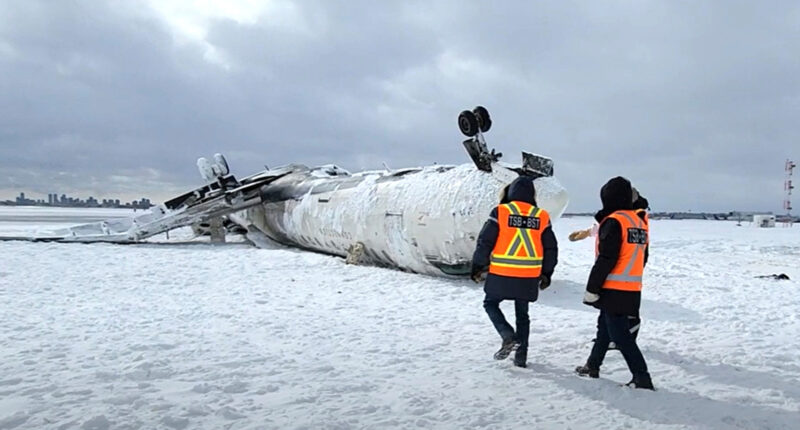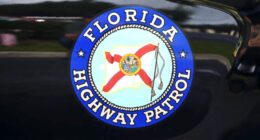After Delta Flight 4819 crashed and flipped at Toronto Pearson International Airport, investigators are trying to determine the cause of the incident. The president and CEO of Toronto Pearson airport mentioned the challenging weather conditions leading up to the accident.
Deborah Flint, Toronto Pearson’s President and CEO, highlighted that the airport experienced severe weather conditions due to two distinct storms from Thursday to Sunday.
“Between Thursday and Sunday, we had over 20 inches (50 centimeters) of snowfall. This amount of snow in that short period is unusual. It exceeded the total snowfall from the entire previous winter,” Flint stated during a news briefing on Tuesday. “The storms caused widespread delays and flight cancellations in this region of Canada and the U.S. Northeast, leading to significant disruptions in air travel.”

Investigators examine the wreckage of a Delta Air Lines jet, Feb. 19, 2025, that burst into flames and flipped upside down Feb. 17, at Toronto Pearson International Airport.
Transportation Safety Board of Canada via AP
“Monday was a clear day, though, and it was an operational recovery day for Toronto Pearson,” Flint said.
The plane, which departed from Minneapolis, crashed amid blowing snow and strong wind gusts in the Toronto area. Winds reached 40 mph on the ground and were even stronger several hundred feet in the air.
When asked if the weather could have contributed to the crash, Flint said, “This would not be a time for us to have theory or to speculate.”
Toronto Airport Fire Chief Todd Aitken said Monday that the runway was dry and there were no crosswind conditions at the time of the crash. When asked Tuesday if the runway had light snow or slush, he deferred the question to investigators.
The Transportation Safety Board of Canada is leading the investigation and investigators from the Federal Aviation Administration and National Transportation Safety Board are assisting. Investigators are expected to review the aircraft at its current position on the runway for the next two days, officials said Tuesday. They will also examine the runway.
Investigators have removed the cockpit voice recorder and the flight data recorder — known as the black boxes — from the aircraft and sent them to a lab for further analysis, Transportation Safety Board of Canada’s Ken Webster said in a video update on Tuesday.
“At this point, it’s far too early to say what the cause of this accident might be. However, we will share more information once we’re able to,” Webster said.
Officials were seen removing parts of the aircraft off the airport’s runway on Wednesday amid the ongoing investigation. The aircraft will be moved to a hangar “where it will undergo further examination,” the Transportation Safety Board of Canada said.
The Delta regional jet — a CRJ 900 aircraft operated by Endeavor Air — touched down, set fire, flipped over and came to a stop upside-down. The 76 passengers and four crew evacuated.
Delta is offering $30,000 to each passenger onboard the plane, the airline confirmed to ABC on Wednesday. Delta Care Team representatives are telling customers this gesture has no strings attached and does not affect rights.
Flint on Tuesday praised the flight crew, saying they “heroically led passengers to safety.”
She said she was grateful there was no loss of life or life-threatening injuries.
“I cannot commend enough the crew, the flight attendants, pilots and our emergency responders for their quick and effective response,” Flint said. “It’s really, really incredible, and when you see that aircraft, it just makes me really thankful.”
Twenty-one passengers were taken to hospitals, and as of Wednesday, 20 of them have been released, according to Delta.
Injuries range from minor to critical, but none are life-threatening, Flint said.
Injuries included “back sprains, head injuries, anxiety, some headaches, nausea and vomiting due to the fuel exposure,” said Cory Tkatch, commander of operations at Peel Regional Paramedic Services.
Three people suffered critical injuries: one child, a man in his 60s and a woman in her 40s, according to medical transport organization Ornge.
There were 22 Canadian citizens among the passengers, Flint said.
The Toronto Airport temporarily stopped flights in the wake of the crash, with departures and arrivals resuming at 5 p.m. ET Monday, the airport said. Two runways remained closed, which Flint said may impact operations.
“Our most pressing priority remains taking care of all customers and Endeavor crew members who were involved,” Delta CEO Ed Bastian said. “We’ll do everything we can to support them and their families in the days ahead, and I know the hearts, thoughts and prayers of the entire Delta community are with them. We are grateful for all the first responders and medical teams who have been caring for them.”
Delta said Wednesday that it “will begin the process of reuniting customers with baggage and personal belongings as soon as possible after authorities have safely removed the items from the aircraft. Securing, identifying, sorting and cleaning all belongings left onboard could take a matter of weeks before all items can be safely returned.”
Copyright © 2025 ABC News Internet Ventures.
















